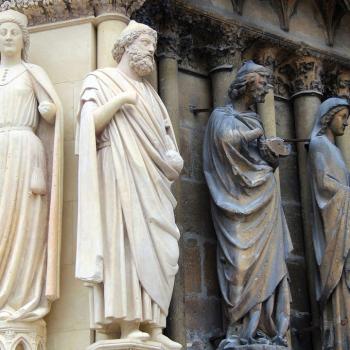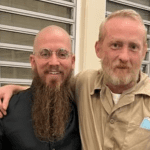Left Behind, pp. 154-156
Rayford Steele is anxiously awaiting the safe return home of his daughter, Chloe.
It's kind of strange that he is not also anxiously awaiting the safe return home of his wife and son. Readers of the book know for certain that those who suddenly disappeared will not be coming back, but the family members they left behind have no such certainty. Rayford's departed wife used to go on and on about the rapture, so he has a pretty good idea what kind of story he's in, but he shouldn't be so certain. He seems to have neither doubts nor denial.
It's not just Rayford — the way LaHaye & Jenkins describe it, Elizabeth Kubler-Ross' stages of grief seem to have been carried off along with all the true believers and children. Everyone seems to be skipping denial, anger, bargaining and depression and moving directly to acceptance:
The news on TV showed the amazing progress being made at clearing the roadways and getting mass transportation rolling again. But the landscape would appear tacky for months, Cranes and wreckers had run out of junkyards, so the twisted wreckages remained in hazardous piles at the sides of roads and expressways.
"Tacky?"
It's weirdly inhuman that the "twisted wreckages" resulting from the mass disappearance should outlast the emotional and psychic wreckage(s). Contrast that with the sentences just before it:
Where was Chloe? He had been inside all day, pacing, mourning, thinking. He felt stale and claustrophobic.
That's not bad — "stale and claustrophobic" is a nice description of the impotent anxiety of waiting. But it's odd that this anxiety should be rendered with more care than the deeper anxiety of grieving the lost. Grieving, after all, feels like waiting. Another troubling thing about all this is that Tim LaHaye is, among other things, a minister and pastor. He has in his charge the spiritual care of a congregation. Is this how he counsels them through their grief?
So here's Rayford, feeling stale and claustrophobic — but not to the extent that he decides to track down what flight his daughter will be arriving on and, perhaps, drive to the airport to meet her. I realize that the roads are still strewn with "hazardous piles," but I don't see that this makes a cab ride home safer for Chloe than if her father were to pick her up.
While we wait, with Rayford, for Chloe's arrival, let's also consider her name: "Chloe." It is, like "Irene," a classical Greek name, but also a biblical one. St. Paul's first epistle to the church in Corinth predates Longus' second-century tale of "Daphnis and Chloe," and the biblical reference seems a likelier source for L&J's choice of this character's name.
This seems a strange choice.
Here is the full extent of Paul's mention of Chloe of Corinth: "My brothers, some from Chloe's household have informed me that there are quarrels among you" (1 Cor. 1:11).
So Chloe was a leader in the local church who appealed to the apostle for help in ending the factional infighting in that troubled community. Paul refers to "Chloe's household," not to "Chloe's husband's household." A female head of a household? According to some from Beverly Tim LaHaye's household, this is anathema. We don't know much about the biblical Chloe, but she probably wouldn't have been a member of "Concerned Women for America."
To pass the time, Rayford dials that number he circled earlier — the office number of his dead wife's church — and hears this message on the answering machine:
"You have reached New Hope Village Church. We are planning a weekly Bible study, but for the time being we will meet just once each Sunday at 10 a.m. While our entire staff, except me, and most of our congregation are gone, the few of us left are maintaining the building and distributing a videotape our senior pastor prepared for a time such as this. You may come by the church office anytime to pick up a free copy, and we look forward to seeing you Sunday morning."
Rayford is delighted by the idea of such a videotape:
What a creative idea, to tape a message for those who had been left behind! He and Chloe would have to get one the next day. …
Copies of the fictional New Hope Village Church's fictional video are, of course, available for sale from LeftBehind.com. The popularity of LB reportedly inspired some actual pastors here in the real world to record similar video messages, just in case.
In his introduction to the video (which we'll get to in another 50 pages or so), the senior pastor, Vernon Billings, says, "That you are watching indicates you have been left behind. You are no doubt stunned, shocked, afraid and remorseful …"
I don't think that follows. This is, after all, a video recording of a dead man, the instructions for which indicate that it is not to be viewed until after his death and the mass-death of everyone in his religious community. The message of the video is, in essence: "We're all dead. You're not. Here's why." At the very best, its message could be spun as "God didn't love you enough to end your life like he ended ours."
I've seen similar videos before — such as those from the Heaven's Gate cult — and while I have been moved to pity, I haven't felt remorse.
The idea of this video reminds me more of The Blair Witch Project, or of those creepily effective anti-smoking ads that Yul Brynner recorded shortly before his death from lung cancer. But in this case the disappeared and departed aren't sounding a cautionary note — they're assuming that survivors will be jealous of them and, therefore, "remorseful." That makes sense, sort of, given the premises of the fictional events in LB, but it's still deeply disturbing.
The good news here on page 155, however, is that a cab arrives at the Steele home and Chloe arrives safely home. Just in time — Rayford's interior monologue was getting rather stale and claustrophobic for us readers and we can be grateful that he's finally got another person to converse with.
Rayford runs out to the driveway to greet his daughter:
"Oh, Daddy!" she wailed. "How's everybody?"
He shook his head.
"I don't want to hear this," she said, pulling away from him and looking to the house as if expecting her mother or brother to appear in the doorway.
"It's just you and me, Chloe," Rayford said, and they stood together in the darkness, crying.
So are they crying because Irene and Raymie are gone? Or are these tears of jealousy and remorse?
















